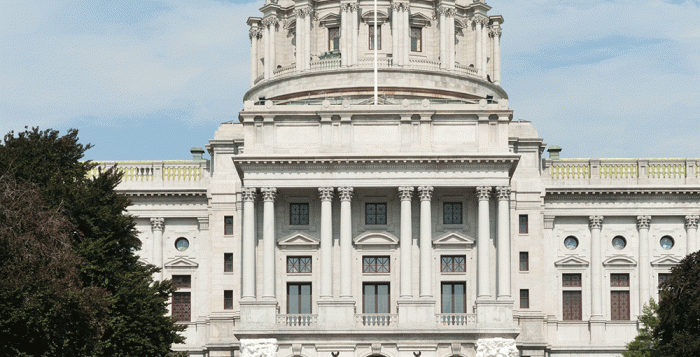Jack Phillips
Governor Wolf to Again Renew PA’s Opioid Disaster Declaration
Later today, Gov. Tom Wolf is scheduled to announce another renewal — the sixth one since he first made the declaration on January 10, 2018 — of a state opioid disaster declaration. Pennsylvania state law regarding disaster declarations is written to address, primarily, natural disasters, and Wolf’s opioid disaster declaration was the first-of-its-kind health emergency-related disaster declaration. Under state law, a state of disaster emergency may be continued by the Governor for no more than 90 days, unless renewed by the Governor or terminated, at any time, by a concurrent resolution approved by the Pennsylvania General Assembly. His office says he plans to talk about two new opioid-related initiatives at the presser this afternoon in the Governor’s Reception Room in the Main Capitol, and he’ll be joined by State Insurance Commissioner Jessica Altman, State Health Secretary Dr. Rachel Levine, Drug and Alcohol Programs Secretary Jennifer Smith, members of the Opioid Command Center, and state legislators. Questions, please contact Jack Phillips.
PA Senate Bill to Expand Role of Nurse Practitioners
HARRISBURG, Pa. (AP, June 12) — Pennsylvania’s Senate is advancing legislation (SB 25) that backers say will help make health care more available through nurses, and less expensive.
The Senate voted 44-6 on Wednesday to allow certified nurse practitioners to practice independently of physicians. Supporters say 22 other states have similar laws.
The Pennsylvania Medical Society opposes the bill. It says there are more effective ways to get health care to underserved areas, and says expanding the role of nurse practitioners may increase health care costs.
Under the bill, nurse practitioners could practice independently after serving a three-year, 3,600-hour collaboration agreement with a physician. Similar legislation has passed the Senate twice previously before dying in the House of Representatives. Questions, please contact RCPA Director of Government Affairs Jack Phillips.
Joint Senate Committees to Study Medicaid Work Requirements
The Senate Majority Policy Committee and the Senate Health and Human Services Committee will hold a workshop on work requirements for able-bodied, non-elderly Medicaid recipients. This workshop will take place on Wednesday, June 12, from 9:30 am to 11:00 am in Room 8 EB in the East Wing of the Capitol Complex in Harrisburg. “Medicaid is one of the most expensive programs in the state and costs are projected to continue to rise,” said Senate Majority Policy chairman David G. Argall (R-Schuylkill/Berks). “Right now we have 486,000 non-disabled, non-elderly Medicaid recipients in Pennsylvania who are not working. We are not trying to drag somebody out of a treatment facility or force great-grandma to work in a coal mine. Rather, our goal is to come together and discuss this issue thoroughly with professionals so that we can come to a meaningful compromise to address this issue.”
If you are in the Harrisburg area and your schedule permits, please attend this workshop. Questions, please contact Jack Phillips.
Legislation Would Make Patient-Brokering Illegal in Pennsylvania
Bucks County Democratic lawmakers are proposing legislation designed to punish drug treatment and testing companies that use vulnerable patients to help boost their profits. State Senator Steven Santarsiero, D-10, of Lower Makefield, and Representatives Tina Davis, D-141, of Bristol Township and Perry Warren, D-31, of Newtown Township, on Thursday unveiled a proposed bill that would make it a felony for health care providers, including drug and alcohol treatment centers, to give or receive money, perks, or other compensation in exchange for patient referrals. The number of licenses for drug and alcohol treatment programs issued in Pennsylvania jumped from 570 to 824 between 2012 and last year, with the biggest surge in the last three years, according to Pennsylvania Department of Drug and Alcohol Programs (DDAP) data. To read the complete article, please use this link. Questions, please contact Jack Phillips, RCPA Director of Government Affairs.
(Source: The Intelligencer; “Legislation would make patient-brokering illegal in Pennsylvania” by Jo Ciavaglia, June 7, 2019)
Proposed Budget Bill Amendment Threatens BH Carve-Out
Over the past few months, legislation has been introduced to eliminate Pennsylvania’s behavioral health carve-out model. Two legislators from York County, Rep. Seth Grove and Senator Kristin Phillips, introduced companion bills HB 335 and SB 268, which call for merging behavioral health with the larger statewide physical health system and network; however, both of these bills have stalled due to push back from stakeholders, who support continuation of the behavioral health carve-out model.
Despite the fact that these bills have stalled in the legislative process, Rep. Grove is urging his leadership to insert a provision into a budget bill (the Health and Human Service Code) to have the Legislative Budget & Finance Committee (LBFC) perform a “study” on the behavioral health carve-out model, thus bypassing the committee and traditional legislative process.
RCPA is asking members to contact their legislators and urge them to reject any efforts to eliminate or weaken the behavioral health carve-out model. When speaking to your legislator, please find talking points for opposing any amendments to budget bills that will affect the behavioral health carve-out model. Questions, contact RCPA Director of Government Affairs Jack Phillips.
PA Takes First Step to Take Over Insurance Exchange
By MARC LEVY
Associated Press
HARRISBURG, Pa. (AP, June 5) — Pennsylvania took a first step Wednesday toward taking over its online health insurance exchange from the federal government in a bid to cut premiums for people who buy policies in the marketplace created by the Affordable Care Act.
Legislation sponsored by the Republican and Democratic floor leaders in Pennsylvania’s House of Representatives won unanimous approval from the chamber’s Insurance Committee.
Democratic Gov. Tom Wolf is pressing for the bill to pass the Republican-controlled Legislature this month in the hope that its savings measures can be in full effect in 2021.
The administration says it can operate the exchange for less money than the federal government does and use the savings to qualify for extra federal funding for a reinsurance program that helps cover certain high-cost claims.
“The products should not change, but the prices will go down, so I think that’s why it’s a win for us here in the commonwealth,” said House Majority Leader Bryan Cutler, R-Lancaster.
In addition to its high-level support in the House, the legislation is backed by the Pennsylvania Chamber of Business and Industry, the Hospital and Healthsystem Association of Pennsylvania and the Pennsylvania Association of Community Health Centers.
Wolf’s administration says the bill would make two important changes to reduce premiums for the 400,000 people who purchase health insurance through the Healthcare.gov online marketplace.
Currently, the federal government takes 3.5% of the premium paid on plans sold through the exchange, or an estimated $94 million this year.
The state can operate the exchange for $30 million to $35 million, Wolf’s administration says.
It could then use the savings to qualify for extra federal reinsurance funds and use the money to reimburse insurers for certain high-cost claims. Those reimbursements would allow insurers to lower premiums across the board within the state’s insurance marketplace, health insurance policy analysts say.
The state’s share would be about 20% or one-quarter of the reinsurance program cost, according to Wolf administration estimates.
“Both the Trump administration and the Wolf administration are interested in it, have been supportive through the process and I was hoping we could lead by example,” Cutler said.
The Wolf administration said its analysis shows that consumers would see premiums that are 5% to 10% lower than what they would otherwise pay.
Twelve states built and operate their own exchanges, while the Washington, D.C.-based nonpartisan Kaiser Family Foundation says seven other states have started a reinsurance program. Evidence from them shows that insurance premiums paid by consumers can drop, analysts say.
States at first struggled with running their own exchanges when they began in 2014 under former President Barack Obama’s signature health care law.
But Sabrina Corlette, a research professor at the Center on Health Insurance Reforms at Georgetown University, said that operating them has become cheaper and simpler as information technology systems have improved and become standardized.
Running its own exchange also gives the state more control over it, Corlette said. As an example, she noted that the Trump administration has suggested that it might end automatic re-enrollment in the exchange’s insurance policies, thus making it more cumbersome for someone to maintain their policy from year-to-year.
But a state that operates its own exchange could simply keep automatic re-enrollment, which is standard in employer-based insurance systems, Corlette said.
Questions, please contact Jack Phillips.
Restore PA Pushed Off to the Fall, Minimum Wage Hike Seems Unlikely
Capitolwire: Restore PA to be pushed off to the fall, minimum wage hike seems unlikely as part of budget, which could start seeing movement the week of June 17, says Corman.
PA GI Bill, PA Farm Bill could get done before summer recess, adds the Senate Majority Leader, though a “reasonable” budget spend total – which Corman again said will be less than Wolf’s February proposal – still needs to be reached.
By Chris Comisac
Bureau Chief
Capitolwire
HARRISBURG (June 5) – Gov. Tom Wolf has said on multiple occasions his Restore PA proposal isn’t tied to the state budget, and it appears that will indeed be the case this month, as legislative Republican leaders don’t plan to consider the proposal until the fall, at the earliest.
“It’s not linked to the budget – the Governor didn’t link it to the budget, as far as a budgetary request – and we’re not going to address it this month,” Senate Majority Leader Jake Corman, R-Centre, during a late Tuesday afternoon interview with Capitolwire, said of the $4.5 billion infrastructure borrowing plan, with the borrowing costs to be paid by a new severance tax proposal.
“To me, this whole Restore PA thing is more about him [Wolf] getting a severance tax” than it is about infrastructure, said Corman.
“It’s not been vetted yet, and we’re certainly not going to create a revenue source that could be a WAM [walking around money] platform, without knowing how this money is going to be spent,” Corman said, who later said, “the whole issue is off for now” while the Legislature explores other options.
Wolf has campaigned across the state in recent months on behalf of the plan, but the Legislature’s majority Republicans, for the most part, have maintained their opposition to a severance tax, which hasn’t gotten much traction during the four-plus years Wolf has been governor, though some Senate Republicans helped to pass a severance tax in an effort to find a compromise to end the 2017-18 state budget impasse (a proposal that failed to win House approval).
“We’re going to continue to talk about Restore PA, and we’re open to feedback from anyone,” said Wolf spokesman J.J. Abbott on Wednesday in response to Corman’s comments.
Noting that a significant part of Wolf’s public relations blitz has focused on using Restore PA money to expand broadband, Corman said, “It’s a great need and he [Wolf] has identified the need, but, unfortunately, the proposal is very specific on the tax he wants to levy – which, obviously, is his crown jewel as he’s been trying for five years to get it – but it has very little specifics on how the broadband would be deployed and how we’d get the private sector involved with this.”
Abbott said the administration has had conversations with plenty of stakeholder groups, and will continue to do so. He also noted Restore PA legislation would soon be introduced [EDITOR’S NOTE: House Bill 1585 and Senate Bill 725 were introduced on Wednesday, though they were not yet available on the General Assembly’s legislative website on Wednesday afternoon].
Corman said the idea of singling out one business or industry to pay for something beneficial to the whole state, like broadband, doesn’t make sense, “we, as a commonwealth, should be supporting this initiative.”
“It’s a very complicated issue that’s going to take significant private sector investment,” said Corman, explaining that back in the early 2000s, much of the available Internet connectivity was accomplished through telephone companies, which were governed by the state’s Public Utility Commission.
“Because of PUC control, we could do flexible rates for them [telephone companies] to get them to do broadband,” said Corman. “Well that was DSL [Digital Subscriber Line, which offers broadband connectivity, but at far slower speeds than are available from other sources], and nobody wants DSL now.”
To accomplish higher speeds, Corman said “you’re talking cable, you’re talking wireless, and that’s done by the private sector which we don’t regulate.”
“And it’s very costly in deployment, and it’s very costly to maintain, and nothing in the Governor’s plan details how he’s enticing them to get involved with this,” Corman continued. “I’ve spoken to several of the major providers and they have had zero-to-little contact with the Governor’s Office on this.”
“It’s not ready at this time, so it’s something we have to push to the fall, at least, and spend the summer working on it,” as well as a Senate Republican plan, said Corman, who indicated his caucus doesn’t plan to wait on Wolf for details that might never come, since broadband deployment is an important issue.
He noted that some Senate Republicans have suggested an alternative – an infrastructure plan supported by revenue from lifting restrictions on gas drilling underneath state-owned forest land – but Corman said that’s not the Senate GOP Caucus’ plan.
The Senate Majority Leader said he’d like to work with the seven local development districts (LDDs) in Pennsylvania, which he noted have been working for a few years on developing and rolling out their own rural broadband plan.
“I think that developing plan has some merit to it, but, again, it needs some work, which makes the whole issue more of a fall issue than a this-month issue,” said Corman, who later added, “I’m not saying it will get done this fall … if he [Wolf] has more details this fall, then it’s a conversation we’ll have.”
Abbott said the administration welcomes hearing other proposals from the Legislature.
A minimum wage hike, for which there was a rally in the state Capitol Rotunda on Tuesday, and which has been linked by some to the budget, also appears to be trending toward a discussion at a later date, as both sides in the issue are, again, waiting to hear from the other.
“I haven’t had any conversations with the administration regarding the minimum wage,” said Corman.
He noted he said this past February that if Wolf were to offer a “reasonable” minimum wage proposal, he’d be willing to have a conversation about it, but he pointed out the Governor’s current proposal remains “unreasonable, and something we wouldn’t even consider.”
“That has not come forward; they have not reached out to talk with me about minimum wage,” said Corman. “So, I’m still in the same position I was back in February.”
When asked if he thinks a minimum wage conversation could begin and be finished before the state budget is completed this month, Corman responded: “I don’t have an idea where they are on how reasonable they want to be … if they want to come and have a conversation that’s maybe a cost-of-living adjustment, that’s something we can discuss, but I’m waiting for them to come forward.”
“At this point, it’s getting late” to get something done before the budget is completed, acknowledged Corman.
Abbott said the administration has made their position known, with the Governor’s minimum wage proposal announced in February as part of his FY2019-20 spending plan. The administration is waiting to see a proposal from legislative Republicans.
“Once we know what they’re willing to consider, then we can start negotiations,” said Abbott.
As for when the FY2019-20 state budget might be completed, Corman said it’s possible, at least at the moment, things could be done and dusted sometime during the week of June 17, but until the votes have been taken in the General Assembly, things are always subject to change.
“You never know,” said Corman. “Would we like to be doing it that week? Sure.”
“I’d like to have it done next week if I could, but that’s not likely,” said Corman, adding that things still have to develop, and depending on that, staying beyond the week of June 17 is still a possibility.
He noted House and Senate Republican leaders are, for the most part, on the same page with regard to the budget – though there are details to still be worked out – but there have been no high-level discussions between legislative GOP leaders and the Wolf administration as yet, only staff-level meetings. Those higher-level discussions are expected “soon,” said Corman.
Abbott confirmed there have been several productive staff-level meetings, but leader-level meetings have not yet occurred.
While indications from the GOP suggest a lot of Wolf’s larger budget-related proposals might not factor into the final product, Corman said some of the smaller ticket items have a chance to make their way into the enacted budget, assuming they fit into the final budget spend total.
Some of those items include the Pennsylvania GI Bill, with the House and Senate having passed their own bills; and the PA Farm Bill, Republican and Democratic bills reflecting Wolf’s proposal which the House on Wednesday advanced from committee. The Senate has already passed its own agriculture-related legislation.
Corman said he thinks the GI Bill can get to Wolf’s desk before the General Assembly’s post-budget summer recess, but he indicated there’s still some more work to be done on the agriculture bills, though he expressed the hopeful intention – which was echoed by House members on Wednesday – of getting those done before the summer break.
“He zeroed out the current agriculture programs and then proposed to spend money on other agriculture programs,” stated Corman. “Clearly we’re going to have to go back and restore those things, as we’ve had to do in the past, and after that, see what we can do with those new initiatives.”
“I’m not going to fund his [initiatives] and then have to figure out how to fund ours,” said Corman. “I’m going to fund ours first.”
“Clearly, we’re all supportive of agriculture in our caucus,” continued Corman. “It’s something we want to do, but we’ll have to get to a reasonable [budget] spend number that includes that.”
And what about that spend number? Abbott said the administration has yet to be given a spend figure by legislative Republican leaders, so they’re waiting for the GOP to reach agreement between the two chambers, which would allow budget negotiations to ramp up.
Corman says his caucus hasn’t moved from the position he and other GOP legislative leaders expressed in early May while talking about the better-than-expected revenue filling the General Fund this year.
“It’s going to be less than what the Governor asked for,” said Corman. Wolf’s Fiscal Year 2019-20 budget proposal released in February asks for a total spend of $34.1 billion. However, there appears to be hundreds of millions of dollars of proposed spending not reflected in the proposed General Appropriations spending lines, in addition to a roughly $500 million supplemental appropriation request to cover unbudgeted costs from the current FY2018-19 enacted last June.
Corman did say coming up with a “reasonable” spend number is being made difficult by the FY2018-19 supplemental request and additional adjustments made by the administration to the FY2019-20 proposal, which, according to Corman, “make it a heck of a lot more spending than he originally proposed” in February, with much of those increases coming in human services budget lines.
“He’s going to have to make a decision: does he want money for human services or does he want money for education?” said Corman of the Governor. “We’d rather spend it on education.”
Arguing Wolf didn’t account for the additional FY2018-19 spending during the year the money was spent, Corman said the Governor “is going to have to look to some of his lines [in the FY2019-20 budget] to make room for it.”
As for the prospective surplus, which some state lawmakers recently have been suggesting could, at least in part, be used for something other than covering FY2018-19 unbudgeted expenses and increasing the state’s Rainy Day Fund, Corman said his caucus, as he stated in early May, still plans to focus the money on balancing the FY2018-19 budget and addressing the state’s budgetary reserves – something Wolf has indicated to be a priority as well.
“We’re not going to spend like drunken sailors, using up all the surplus, and then wake up with a big hangover and a huge budget hole,” said Corman.
Questions, please contact RCPA Director of Government Affairs Jack Phillips.
Atty General Josh Shapiro Announces Grand Jury Recommendations for PA Medicaid Program
(From the Pennsylvania Attorney General’s office)
Attorney General Josh Shapiro Announces Grand Jury Recommendations for the Pennsylvania Medicaid Program
FOR IMMEDIATE RELEASE — April 15, 2019
CONTACT: Joe Grace, 717-574-9095, [email protected]
HARRISBURG — Attorney General Josh Shapiro today announced recommendations from a statewide Grand Jury investigation into the Pennsylvania Medical Assistance (MA) Program. The legislative actions recommended by the Grand Jury aim to assist the Pennsylvania Department of Human Services in identifying and preventing fraud from occurring in the program and provide law enforcement, particularly the Pennsylvania Office of Attorney General’s Medicaid Fraud Control Section, with the tools it needs to effectively investigate fraud within the program.
The Pennsylvania Medical Assistance—or Medicaid—program is implemented by the Department of Human Services and provides care to more than 2.7 million low-income Pennsylvanians. The Office of Attorney General’s Medicaid Fraud Control Section is dedicated to prosecuting anyone who defrauds the MA Program through unlawful billing or failing to provide services to those whom the program serves.
In the 2017 and 2018 calendar years, the Medicaid Fraud Control Section made a total of 292 arrests, achieved 173 convictions, and recovered more than $34 million for the commonwealth, making it the third highest ranking Medicaid fraud control unit in the country. Last month, the Section was nominated and selected for the U.S. Inspector General’s Award for Excellence in Fighting Fraud, Waste, and Abuse.
“Medicaid provides essential care to some of Pennsylvania’s most vulnerable citizens, including low-income individuals, children with serious health conditions, and individuals suffering from substance use disorder,” said Attorney General Josh Shapiro. “When bad actors take advantage of the system, they deny these people the care they deserve, take advantage of hard-working care providers, and scam Pennsylvanians out of their hard-earned tax dollars.”
This investigation stemmed from two independent Medicaid Fraud investigations that prompted the Grand Jury to conduct an investigation into how to identify and prevent fraud and ensure delivery of satisfactory care within the MA Program.
The Grand Jury heard testimony from state regulators, law enforcement officials, managed care organizations (MCOs), and health care providers about the MA program. They identified the following three systemic issues within the MA program that permit the exploitation of care-dependent Pennsylvanians for financial gain and impact the quality of care provided:
- The MA system does not currently require the individual providing services to be identified on the claim submitted for payment.
- MA claims submitted for payment do not require specific date and time information before payment is made.
- The individuals providing these services lack the knowledge and training to provide quality care and to properly bill for those services.
The Grand Jury heard evidence from six cases that illustrate these deficiencies in the system. In one case, an individual who was simultaneously working for three behavioral health agencies and as a substitute special education teacher would submit timesheets claiming she was providing services which overlapped with each other and/or her work as a teacher. The Grand Jury concluded that her fraud would have been caught sooner if there had been a mandate that the claims identify her as the individual providing the services and include specific dates and times of the services.
In a second case, a mother of a daughter with autism was directing her daughter’s caregivers to provide unauthorized services such as painting the house, feeding the dog, and running household errands. She was also instructing the workers to report their services incorrectly and falsely reporting that her husband and son provided services. The Grand Jury concluded that if the program had a standardized training module, the workers would have been able to identify that they were being required to document their services improperly and that the tasks assigned to them were not authorized. They would have also been more informed about how to report these violations.
The Grand Jury provided the three following recommendations to address these deficiencies. The Grand Jury asserted its belief that these recommendations will assist DHS in carrying out its mission and will provide the MFCS with the tools it needs to effectively combat fraud, resulting in increased criminal convictions and recoveries:
- State Provider Identifier (SPI): The legislature should enact a statute mandating that any individual seeking to provide services paid for, in whole or in part, with MA funds who does not have a National Provider Identifier (NPI) be required to register with the Commonwealth of Pennsylvania and obtain a SPI prior to the performance of said services. The legislation should mandate that every claim for MA services identify the actual individual providing the services by requiring that the providing individual’s NPI or SPI be placed on every claim.
- Date and Time Specificity: The legislature should enact a statute mandating that every claim for MA services document every date that a service was provided as well as the start and end times for each date of service.
- Standardized Training: The legislature should require that DHS establish and mandate standardized training for all persons providing services utilizing SPI. The standardized training should be specific to the type of services being provided and focus on the required level of care the recipient is to receive and what services are appropriately billable under that program. The training should also provide information on how to contact Protective Services and where to report fraud within the MA program. The standardized training for each specific type of service must be completed prior to providing services.
“Working with our partners in Governor Wolf’s Department of Human Services, we’re dedicated to doing everything in our power to ensure that the Medical Assistance Program runs as effectively as possible and minimize its vulnerability to fraud,” said Attorney General Shapiro. “I am grateful for the work of the Grand Jury to develop comprehensive, manageable recommendations for how to identify and prevent fraud in the program. These recommendations will make it easier for law enforcement to protect Pennsylvanians and for DHS to make sure people are getting the care they need.”
# # #
















